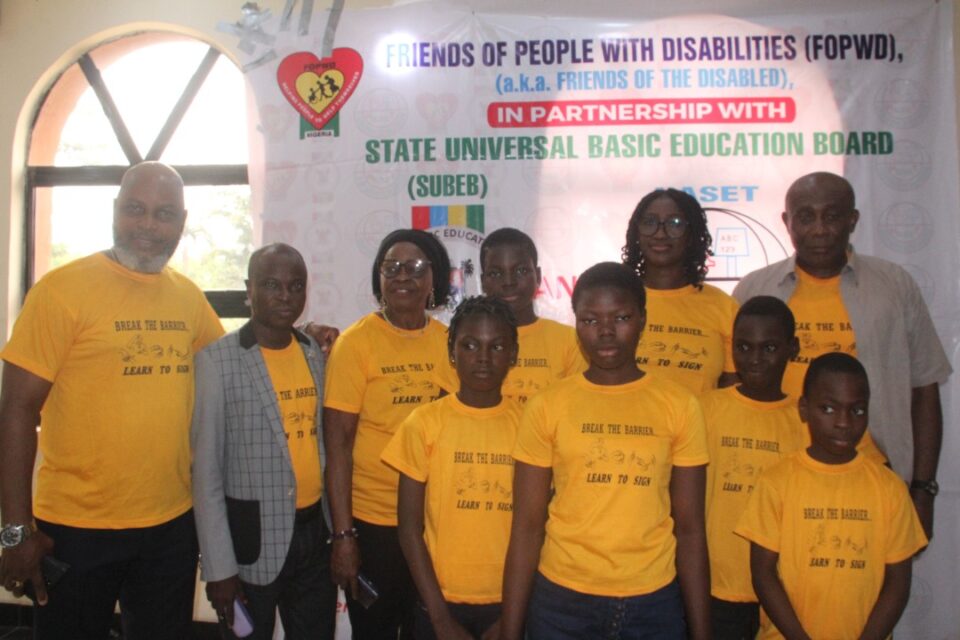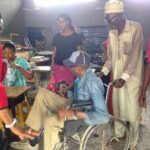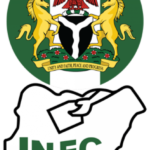Imagine a world where the speech and hearing-impaired will seamlessly communicate with the non-impaired without a translator, or of possibilities where medical personnel can accurately diagnose the needs of a speech-impaired person without an interpreter?
ANTHONY NWACHUKWU and JOHN SILAS, who were at the launch of the Sign Language Club in Lagos, here report.
Like the biblical mustard seed, the scenario of a more inclusive world is already underway in Nigeria, pioneered by a non-governmental organisation, Friends of People with Disabilities (FOPWD), otherwise known as Friends of the Disabled (FOTD), which is planting the Sign Language Club for persons across ages and divides.
At the launch of the club in Lagos last week, the atmosphere was electrifying as about children from different districts, backgrounds and mixed abilities (impaired and non-impaired) excitedly shared, performed and responded simultaneously and alike to single instructors, single instructions.
According to the FOTD Executive Director, Lady Aku Christy Orduh, the change-making ceremony, aimed at celebrating “barrier breakers and emphatic children who have shown and taken to conquer one disability through learning a language, could not have been possible or easy without change to inclusiveness and inclusive approach in the school system.”
It was therefore gratifying that some children from the inclusive school units of the primary school across all local government areas of Lagos State were at the event in solidarity with their peers with hearing/speech impairment to identify with the “Everyone A Change Maker” campaign.
A member of the Ashoka Fellowship, who pride themselves with undertaking in extraordinary way anything that brings change or impacts other people positively, Orduh disclosed that the journey began since 2005 when she discovered the discrimination and isolation faced by those with hearing or speech impairment in getting jobs or establishing their own businesses.
According to her, “those who graduated from our vocational centre, especially the females, found it difficult even to progress economically when they established their own businesses. So, Friends of the Disabled started a campaign and public enlightenment to see what could be done.”
This campaign began making headway when in 2001, the then Lagos Commissioner for Health, Dr. Leke Pitan, visited the centre and was made to know the discrimination and isolation being faced by the hearing and speech impaired in a society that does not know their language.
The solution is learning of sign language and being together to enable them fit into the mainstream of the society, she noted, and the state government welcomed the idea. They also wrote to the Federal Ministry of Education in 2005 and 2006, after which they were invited to the multi-stakeholder forum and a subsequent workshop in October.
There, “we presented a paper on inclusive approaches and inclusive education, highlighting all the benefits to the impaired, the peers, parents, the society and the world.
“The outcome of that forum and workshop was a policy change for co-education for both people with and without disabilities in one school compound,” in response to the 1994 Salamanca (Spain) Agreement, which had over 300 participants, 92 governments and 25 international organisations in attendance.
The goal was to further the objectives of “Education for All” by considering the education policy shifts required to promote approaches for inclusive education, namely, enabling schools to serve all children, particularly those with special needs.
Meanwhile, the foundation’s pilot project in Ereko Methodist Primary School and some private schools in Shomolu were very successful, bringing a lot of excitement to the children, some of whom preferred it to their initially chosen extra-curricular activity, Orduh recalled.
Today, “we are happy and fulfilled that these efforts have yielded the expected result of getting young children devoted to tackling a social problem through learning a language that is common to them.
“How else could they have learnt it easily and effectively if not by studying and being in the same environment? It is cost effective and the isolation and discrimination are no more there in their body system.”
The foundation is also partnering the National Youth Service Corps (NYSC) under the Skills Acquisition and Entrepreneurship Development (SAED) to reduce the unemployment gap, where it teaches them sign language online.
The focus is not only to communicate with the hearing impaired but to also acquire a skill to get jobs more easily than those without the sign language ability.
Having come this far, and having proved the genuineness and necessity of this initiative against discrimination and isolation, the foundation is calling for assistance under the umbrella, “Sponsor a Sign Language Club.”
“We call on companies that produce what children need most – Cadbury, Indomine, Coca-Cola, La Casera, 7-UP and those that deal in writing materials.
“Individuals are most needed to extend hands of friendship and solidarity with this club. As a club, they will be legal and operate with rules and regulations. We look forward to partnering these companies and individuals that want to identify with conquering one disability through learning a language”, she said.




